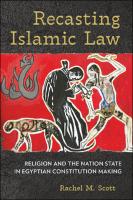Recasting Islamic Law
Religion and the Nation State in Egyptian Constitution Making
Author(s)
Scott, Rachel M.
Collection
Toward an Open Monograph Ecosystem (TOME)Language
EnglishAbstract
By examining the intersection of Islamic law, state law, religion, and culture in the Egyptian nation-building process, Recasting Islamic Law highlights how the sharia, when attached to constitutional commitments, is reshaped into modern Islamic state law. Rachel M. Scott analyzes the complex effects of constitutional commitments to the sharia in the wake of the Egyptian Revolution of 2011. She argues that the sharia is not dismantled by the modern state when it is applied as modern Islamic state law, but rather recast in its service. In showing the particular forms that the sharia takes when it is applied as modern Islamic state law, Scott pushes back against assumptions that introductions of the sharia into modern state law result in either the revival of medieval Islam or in its complete transformation. Scott engages with premodern law and with the Ottoman legal legacy on topics concerning Egypt's Coptic community, women's rights, personal status law, and the relationship between religious scholars and the Supreme Constitutional Court. Recasting Islamic Law considers modern Islamic state law's discontinuities and its continuities with premodern sharia. Thanks to generous funding from Virginia Tech and its participation in TOME (Toward an Open Monograph Ecosystem), the ebook editions of this book are available as Open Access volumes from Cornell Open (cornellpress.cornell.edu/cornell-open) and other repositories.
Keywords
Egyptian revolution of 2011, religion and state in Egypt, Sharia, Islamic Law, religion and politics,DOI
10.7298/861k-fr61ISBN
9781501753985, 9781501753978, 9781501753992, 9781501753985, 9781501753992Publisher
Cornell University PressPublisher website
https://www.cornellpress.cornell.edu/Publication date and place
Ithaca, 2021Imprint
Cornell University PressClassification
Islam
Middle Eastern history
Social groups: religious groups and communities


 Download
Download Download
Download Web Shop
Web Shop